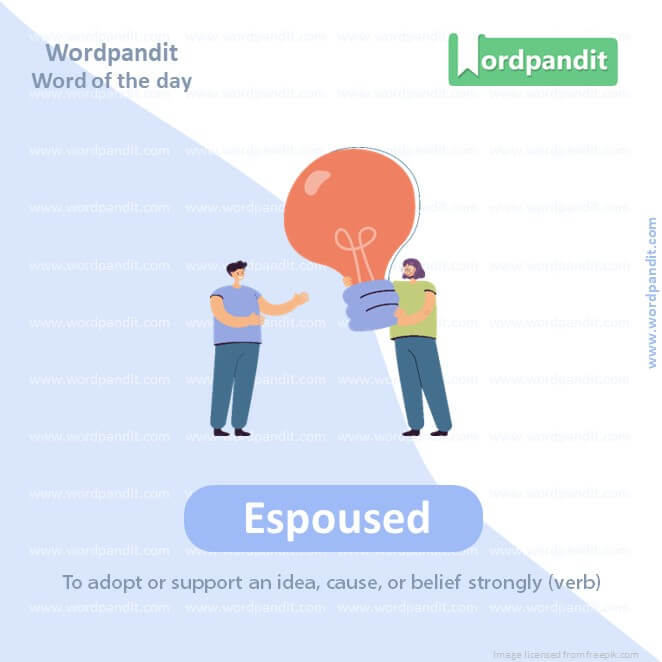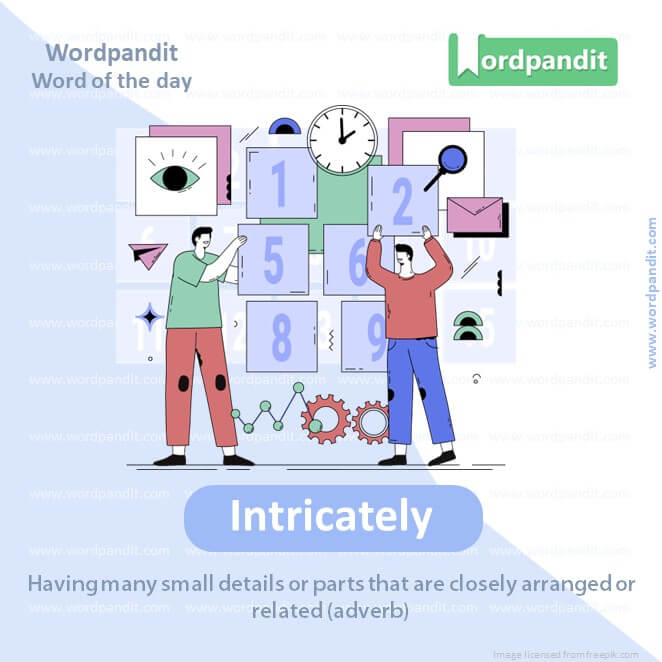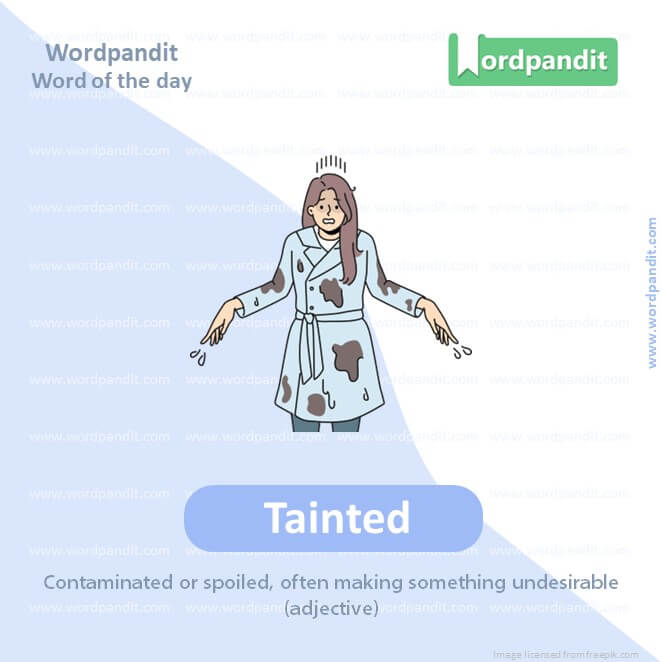Daily Vocabulary Words: List of Daily Used Words
Hi there. Welcome to this special section @ Wordpandit.
Our endeavour here is straightforward: highlighting important daily vocabulary words, you would encounter in The Hindu. This is your repository of commonly used words; essentially, we are posting a list of daily used words. Hence, this has significant practical application as it teaches you words that are commonly used in a leading publication such as The Hindu.
Visit the website daily to learn words from The Hindu.

WORD-1: Espoused
CONTEXT: This is particularly important given India’s nuclear doctrine based on a no-first-use policy, credible minimum deterrence and massive retaliation in case of a first strike, which was espoused in 2003, after the nuclear tests of 1998.
SOURCE: The Hindu
EXPLANATORY PARAGRAPH: When someone really believes in something and talks about it a lot, they are “espousing” it. It’s like when you love your favorite toy and tell everyone how great it is.
MEANING: To adopt or support an idea, cause, or belief strongly (verb)
PRONUNCIATION: eh-SPOUZD
SYNONYMS: Advocate, support, embrace, champion, endorse
USAGE EXAMPLE:
1. She espoused the importance of environmental conservation in her speech.
2. He has long espoused the benefits of a healthy lifestyle.
3. The organization espouses equality for all its members.
4. They espoused traditional values in their approach to parenting.

WORD-2: Scarcity
CONTEXT: The global challenge for securing access to clean water persists for about two billion people and its demand keeps rising. Beyond threatening our basic individual human needs, this scarcity also poses a risk to our collective prosperity and peace.
SOURCE: The Hindu
EXPLANATORY PARAGRAPH: Imagine if there were only a few cookies left in the jar, and everyone wanted one. That’s called “scarcity.” It means there’s not enough of something for everyone who wants it.
MEANING: A situation in which there is not enough of something (noun)
PRONUNCIATION: SKAIR-suh-tee
SYNONYMS: Shortage, dearth, insufficiency, paucity, deficiency
USAGE EXAMPLE:
1. The scarcity of water in the region led to conflicts among the villagers.
2. During the drought, there was a scarcity of fresh produce in the market.
3. The scarcity of jobs in the area forced many people to move elsewhere.
4. The scarcity of resources made it difficult to complete the project on time.

WORD-3: Intricate
CONTEXT: The shared recognition that water is a vital resource, with limitations in quality and availability, necessitates collaborative governance to ensure effective and equitable water allocation among nations, fostering regional stability and peace, and an understanding of the intricate relationships between water, climate, and international stability.
SOURCE: The Hindu
EXPLANATORY PARAGRAPH: When something is very detailed and has many small parts that fit together, it’s called “intricate.” It’s like a puzzle that’s really hard to solve because it has so many tiny pieces.
MEANING: Having many small details or parts that are closely arranged or
related (adverb)
PRONUNCIATION: IN-tri-kit
SYNONYMS: Complex, elaborate, intricate, complicated, convoluted
USAGE EXAMPLE:
1. The artist created an intricate design using fine lines and patterns.
2. The plot of the novel was so intricate that it kept readers guessing until the end.
3. The watchmaker’s work was known for its intricate craftsmanship.
4. Building the model ship required following the intricate instructions carefully.
WORD-4: Impinge
CONTEXT: they believe that this may impinge upon the independence of the judiciary. Others, including those in the government, have pointed out that such posts often require judicial personnel of the highest integrity and there is no Constitution bar to this effect.
SOURCE: The Hindu
EXPLANATORY PARAGRAPH: When something gets in the way or affects something else, it’s “impinging.” It’s like when a loud noise interrupts your favorite song, and you can’t hear it properly.
MEANING: To have an effect on something, especially in a negative way (verb).
PRONUNCIATION: im-PINJ
SYNONYMS: Encroach, infringe, intrude, impact, influence
USAGE EXAMPLE:
1. The construction noise impinged on their ability to concentrate.
2. The new regulations impinged on their freedom to operate the business.
3. The economic downturn impinged heavily on the company’s profits.
4. Her absence impinged on the team’s performance during the competition.
WORD-5: Entrants
CONTEXT: I think the time has come for the judiciary to clearly restate its values and even take an undertaking from fresh entrants that they will not join active politics before a cooling-off period of two or three years.
SOURCE: The Hindu
EXPLANATORY PARAGRAPH: Imagine there’s a race or a competition, and new people join to participate. These new people are called “entrants.” They’re the ones who are just starting to be a part of the race or competition.
MEANING: People or things that enter or join a competition, event, or group (noun).
PRONUNCIATION: EN-truhnts
SYNONYMS: Participants, competitors, contestants, newcomers, arrivals
USAGE EXAMPLE:
1. The number of entrants in the art competition exceeded expectations.
2. New entrants to the market often face challenges in establishing themselves.
3. The race had a record number of entrants this year.
4. Entrants were required to submit their applications before the deadline.

WORD-6: Tainted
CONTEXT: it has been tainted by some expectation of a post-retiral benefit.
SOURCE: The Hindu
EXPLANATORY PARAGRAPH: Imagine if you accidentally spilled some paint on your favorite shirt and it left a mark. That mark is like a “taint.” It’s something that makes something else look bad or less pure.
MEANING: Contaminated or spoiled, often making something undesirable (adjective).
PRONUNCIATION: TEYN-tid
SYNONYMS: Contaminated, spoiled, corrupted, tainted, impure
USAGE EXAMPLE:
1. The reputation of the company was tainted by the scandal.
2. The food was thrown away after being tainted by bacteria.
3. The politician’s past actions came back to haunt him, tainting his campaign.
4. The water in the river was tainted with pollutants from nearby factories.
WORD-7: Extraneous
CONTEXT: If a judge accepts a post-retirement appointment from the government, they are bound to doubt whether their judgments were delivered for extraneous reasons.
SOURCE: The Hindu
EXPLANATORY PARAGRAPH: Imagine you’re trying to build a tower out of blocks, but some of the blocks are not needed and just get in the way. Those unnecessary blocks are “extraneous.” They don’t belong in the tower.
MEANING: Not necessary or relevant, extra or unnecessary (adjective).
PRONUNCIATION: ik-STREY-nee-uhs
SYNONYMS: Unnecessary, irrelevant, superfluous, redundant, surplus
USAGE EXAMPLE:
1. The professor asked the students to focus on the main points and avoid including extraneous details in their essays.
2. She deleted the extraneous files from her computer to free up storage space.
3. The committee removed the extraneous clauses from the proposal to streamline it.
4. The speaker’s extraneous comments during the presentation confused the audience.
WORD-8: Trappings
CONTEXT: When judges hanker for the trappings of power, it is a sad day for the judiciary.
SOURCE: The Hindu
EXPLANATORY PARAGRAPH: Imagine a king or queen with all their fancy clothes, crowns, and jewels. These fancy things they wear are called “trappings.” They’re like special decorations that show someone’s important role.
MEANING: The outward signs, features, or accessories associated with a particular role or position (noun).
PRONUNCIATION: TRAP-ingz
SYNONYMS: Accessories, adornments, embellishments, accoutrements, paraphernalia
USAGE EXAMPLE:
1. The CEO enjoyed the trappings of success, such as a luxury car and a private jet.
2. The ceremony was marked by the traditional trappings of royalty.
3. Despite his humble beginnings, he soon acquired the trappings of wealth and status.
4. The movie star was surrounded by the trappings of fame wherever she went.

WORD-9: Competent
CONTEXT: the government is not going to bring any law. My view is that any competent lawyer can do the job reserved for a retired judge.
SOURCE: The Hindu
EXPLANATORY PARAGRAPH: When someone is really good at doing something, they are “competent.” It’s like being really good at building sandcastles at the beach or riding a bike without falling.
MEANING: Having the necessary ability, knowledge, or skill to do something
successfully (adjective)
PRONUNCIATION: KOM-pi-tuhnt
SYNONYMS: Capable, skilled, proficient, qualified, adept
USAGE EXAMPLE:
1. She is a competent swimmer and can handle rough waters with ease.
2. The company hired competent professionals to manage their finances.
3. His competent handling of the project earned him praise from his colleagues.
4. Competent leadership is essential for the success of any organization.
WORD-10: Conceivably
CONTEXT: If a reasonably fair and transparent method of allotment is worked out, then one could conceivably use the services of judges in judicial functions to a greater degree.
SOURCE: The Hindu
EXPLANATORY PARAGRAPH: When something is possible to imagine or think about, it’s “conceivably.” It’s like when you imagine flying to space or having a magical adventure in a faraway land.
MEANING: In a way that is possible to imagine or consider (adverb).
PRONUNCIATION: kuhn-SEE-vuh-blee
SYNONYMS: Possibly, potentially, feasibly, imaginably, likely
USAGE EXAMPLE:
1. The project could conceivably be completed within the next month if we work diligently.
2. It is conceivably possible to travel to the moon in the future.
3. Changes to the policy could conceivably lead to better outcomes for everyone involved.
4. With the right resources, it is conceivably achievable to eradicate poverty.
Vocabulary Daily Words
Among the myriad aspects of language learning, the role of ‘vocabulary daily words’ attests to their undeniable importance. These everyday words form the bedrock of communication. Whether used in casual chat or formal discussion, the fluency and understanding of ‘vocabulary daily words’ can significantly uplift the quality of interaction. However, the vital question is, how to effectively learn these ‘vocabulary daily words’?
The crux of learning ‘vocabulary daily words’ lies in a well-rounded approach that encompasses exposure, understanding, memorization, and practice. Rote memorization might seem like a quick solution, but it lacks context and, thereby, retention. Hence, opt for a diverse range of resources like books, newspapers, podcasts, and digital media. These will bring ‘vocabulary daily words’ to life, providing real-life usage examples and making the learning process inherently engaging.
Next, using memory-enhancing techniques can significantly improve retention of ‘vocabulary daily words’. Techniques such as flashcards or the Leitner System align with the principles of spaced repetition, allowing more effective and long-term learning. Incorporating mnemonic devices, associating new words with unique stories or images, can further facilitate this learning process.
The key to fully grasping ‘vocabulary daily words’ lies in practical usage. Make it a habit to use these words in your daily communications. Whether it’s a friendly conversation, a professional email, or a social media post, try integrating these new words. Doing so provides hands-on practice, strengthening your comprehension and application of these words.
In a nutshell, ‘vocabulary daily words’ are a treasure in the language learning landscape. By harnessing diversified resources, utilizing memory techniques, and actively using these words, your grip on the ‘vocabulary daily words’ will strengthen significantly. So, turn the pages, hit play, start a conversation, and let these ‘vocabulary daily words’ shape the story of your linguistic journey.










